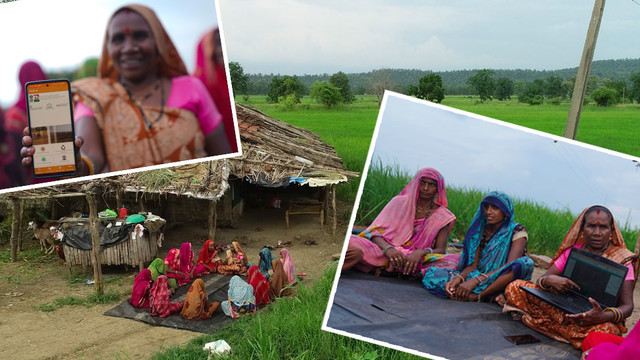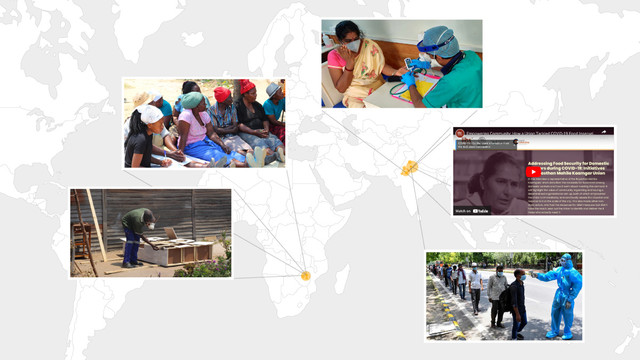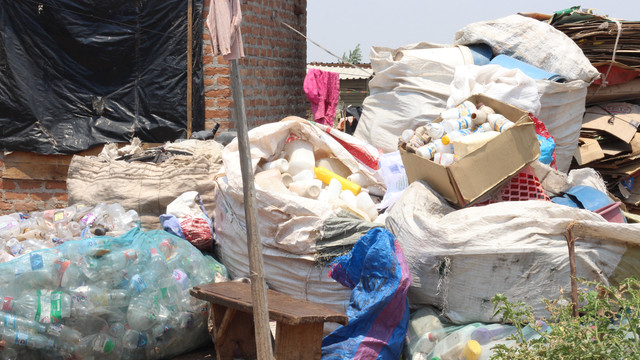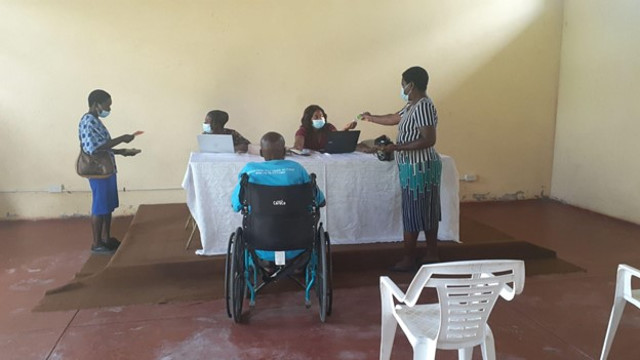Understanding the long-term social and economic impacts of COVID-19 in low income urban communities
Asked about the impact of COVID-19 on three informal settlements in Harare, Zimbabwe, community focus groups revealed the long-term social and economic impacts on their everyday life.

Women actively participating in a focus group discussion in Caledonia (Photo: KnowYourCityTV Zimbabwe)
As part of the COVID Collective research, community focus groups were arranged in 2023 with the residents of three informal settlements in Harare: Tafara, Hopley and Caledonia.
The discussions focused on the impact and implications of COVID-19 on residents and provides evidence for policy reform to strengthen urban crisis response.
The focus group discussions explored the effects of COVID-19 and how the public health response to the pandemic impacted on residents living in informal urban settlements.
The primary areas of discussion were the social and economic impacts on everyday life and the immediate and lasting consequences of these for communities. Below is a summary of the data analysis.
Impacts
The marginalised and unofficial status of informal settlements were key factors in the type and level of public support open to residents of these communities.
Informal settlements are considered to be illegal and are not included in either public service delivery nor are the residents of these areas counted in government statistics.
During COVID-19, populations in informal settlements were largely denied access to official social protection schemes and other forms of government assistance. Moreover, informal settlements were demolished by the government and the residents were evicted, actions that were justified as important to contain the spread of the virus.
However, residents of affected areas perceived these actions as the government using the cover of the virus to implement clearances of informal settlements.
Based on the focus group data, there were a number of specific implications of the pandemic and the government’s public health response that impacted on the wellbeing of residents.
Livelihoods
The pandemic had a severe impact on livelihoods. The closure of workplaces and informal markets, and restrictions to mobility within the city, deepened existing levels of poverty for residents of informal settlements.
People were unable to access normal sources of employment or undertake trading, with restrictions on movement meaning that they were unable to travel within the city to secure work. Key issues identified in the focus groups included:
- A sudden loss of income affected all aspects of life – individuals were reliant on limited savings and support from grassroots organisations
- Closure of informal markets and street vending halted the sale of produce and other goods by vendors
- Those without land, in low-income settlements, were unable to transfer their work activity (such as carpentry) to their homes, to continue generating an income
- Loss of income lead to hunger, with families reducing the number of meals to one per day and some children becoming malnourished, and
- Informal and self-employed workers were unable to obtain travel permits as essential workers, to carry on their trade, (food vendors in South Africa were considered essential workers as they were the main sources of supply to residents in low-income areas).
The dramatic loss of income was accompanied by additional costs of complying with COVID-19 restrictions. This included the purchase of masks, soap and additional water to maintain hygiene standards.
The loss of income also made the environment more dangerous, with an increase in burglary and street robbery as people competed for food and resources.
Isolation
The isolation of informal settlements was made worse during the pandemic, with the physical disconnection of communities from the key services of cities, the illegal status of settlements and the social marginalisation of residents combined to further disadvantage people in informal communities.
Issues identified during the focus groups included:
- Inadequate road surfaces made movement in and out of settlements difficult and this difficulty was used as a justification by city government for a lack of support to local residents
- Public information on COVID-19 regulations and support arrangements by the government was made through TV and radio – but given most residents of informal settlements do not have access to broadcast media or reliable electricity, they were not able to keep up with bulletins
- Curfews and roadblocks restricted the mobility of people to engage in work or connect with family members during the pandemic
- A lack of connection with reticulated water and sanitation systems meant that settlements had to drill boreholes or bear the additional costs of purchasing water, and
- Individuals without formal ID or permanent addresses were unable to join the Department of Social Welfare list of people in need of support – so were unable to qualify for social protection.
Gender and family issues
The pandemic had a major and lasting effect on families and relationships. In informal settlements, women carry the bulk of responsibility for looking after the home and children and experienced a disproportionate impact on their lives and wellbeing.

A woman actively engaged in a focus group discussion in Hopley (Photo: KnowYourCityTV Zimbabwe)
There were increased tensions between partners that were fuelled by a lack of work and income, which resulted in a high rate of relationships breaking down. There was:
- Increase gender-based violence, with raised tensions in the home caused by a lack of work, hunger and frustration during the lockdown
- Lack of pre-natal and maternity support, resulting in higher numbers of home births and increased infant mortality rate. The home births also resulted in fewer birth registrations, which may have later consequences for obtaining identity documents
- The lack of nutrition for mothers meant that there was an early weaning of babies
- Restricted access to hospital facilities due to COVID-19 meant that babies did not receive early childcare checks and vaccinations
- Women sex workers were made more vulnerable, with an inability to obtain condoms, the closure of clinics for sexually transmitted infections, and sexual assault from the military, police and water vendors
- There was a shortage of medicines, which particularly impacted on individuals with disabilities and the parents of disabled children. More generally it was difficult to afford or obtain medicines to treat COVID-19, and
- For men, the lack of work created frustration that they were not able to provide for their families, which led to conflict within the home. The closure of bars and public spaces reduced the ability to obtain support from peers.
On young people
The pandemic had a significant effect on young people that experienced the long closure of schools and delays in their transition to adulthood.
The focus groups reported that young people with nothing to do lost motivation and turned to self-destructive behaviours. There was:
- An increase in drug and alcohol-taking among young people that was accompanied by anti-social behaviour and an increase in theft from the home
- A loss of education; with schools closed lessons could only be taken with an internet connection or people could listen to education programmes broadcast on the radio. This was largely inaccessible for many children living in informal settlements
- An increase in child marriage as a response to falling family incomes, as marriage reduced the number of mouths to feed and potentially generated a dowry income
- A rise in the number of teenage pregnancies and young people engaged in sex work to generate an income, and
- A refusal to return to school from some young people when schools reopened.
Social relationships
Social networks and relationships are particularly important sources of support for people living in poverty.
The lockdown conditions imposed under COVID-19 disrupted these links, with a significant effect on individual wellbeing. Key issues identified by community members included:
- Not being able to attend churches, which meant that people had to pray at home, but also meant diminished levels of pastoral support and advice during the pandemic
- Limits on community meetings; while savings groups and mutual support arrangements provided a vital form of support during the pandemic, residents faced restrictions in meeting people outside their immediate households, and
- Not being able to attend funerals was a major break with social norms and affected the processing of grief and loss during the pandemic.
On assets
Holding assets such as property and goods for sale are vital to help stabilise finances and help people avoid sliding into deeper poverty during periods of crisis.
Community members highlighted how the loss of livelihoods and actions by the state during the pandemic reduced their assets and placed them in a more vulnerable position. Comments included:
- How individuals sold their property for lower than their value in order to generate an income at a time when no work was available
- The military and police authorities, during the pandemic, confiscated stock that individuals would have sold as market and street vendors
- People were unable to sell collected waste materials at a good price (see photo), and
- Individuals experienced an increased level of theft, which in turn reduced capacity to cope with the crisis period.
Community responses
While there were a wide range of factors that negatively impacted on residents of informal settlements during the pandemic, there were also positive responses through collective action and reciprocal support. This included:
- People sharing food among neighbours, providing assistance when there was sickness or funerals
- Communities working collectively to drill boreholes and trenches to improve access to and distribution of water within settlements
- Examples of collective enterprise activity, making masks and soap, with income shared among the participants
- A sharing of fire wood, where available, within the community
- Settlements establishing small garden areas next to dwellings to grow food (see photo)
- Donations of water to other communities
- Neighbourhood watches set up by men to reduce theft and muggings
- People buying and selling goods within their community to capture the full value of local expenditure, and
- Multiple efforts to provide support and source medicines for people that were sick and isolated in their dwellings.
While there was limited support from the government to informal communities, the focus group discussions identified a number of Zimbabwean and international third sector organisations that provided people with food, water and medicines during the pandemic.
These provided a vital source of external support to supplement what the communities were doing themselves to provide relief.
Implications
The focus group meetings in Tafara, Hopley and Caledonia highlighted a range of issues important for public policy. At the core is the informal status of these communities and the lack of formal recognition that would provide access to public services available to other citizens of Zimbabwe.
The lack of investment in basic infrastructure, including roads, water, sanitation and electricity, all factored in how the pandemic impacted on community members and will continue to be significant for managing future health and environmental crisis.
Children and young people were disproportionately impacted by the pandemic. Communities highlighted the importance of policy that allows children to catch up on missed education and have access to childhood vaccinations and training to enable young people to gain skills and access employment.
Communities are also looking to agree on a new compact with the government that addresses unequal access to social protection. They want to see an end to illegal demolitions of property and to the excessive force used by police and military personnel during the pandemic.
The article was compiled by Teurai Nyamangara, Tarisai Manyowa and Shiela Muganyi.




